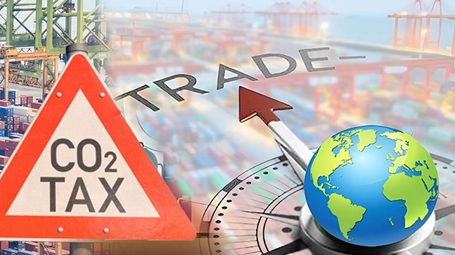| (Mains, General Studies Paper-2: Bilateral, Regional and Global Groups and Agreements involving and/or affecting India’s interests) |
Context
With the European Union (EU) offering concessions to US manufacturers on controversial climate-related trade rules, such as the Carbon Border Adjustment Mechanism (CBAM) and deforestation regulation, Indian negotiators are planning to press for similar relief during the talks in Brussels in September.

EU Climate Trade Rules
- The CBAM imposes a carbon tariff on imports of carbon-intensive goods (such as steel, cement, aluminium, fertilisers).
- According to the EU, the CBAM is not a trade measure. It is not part of the trade and free trade agreement with India.
- It is related to compliance with the climate agenda to accelerate decarbonisation.
- It aims to prevent ‘carbon leakage’ and push global producers towards cleaner technologies.
EU-US Trade Agreement
- The EU has softened its stance towards the US on other climate-trade measures such as the Corporate Sustainability Due Diligence Directive (CSDDD).
- The CSDDD makes large companies legally responsible for identifying and addressing human rights and environmental risks in their operations and global supply chains.
- The EU said it will try to ensure that these measures do not impose undue restrictions on transatlantic trade.
- The EU is committed to addressing US concerns regarding the imposition of CSDDD requirements on companies from non-EU countries with relevant high-quality regulations.
Arguments from different countries
- From January 2026, the EU carbon tax will apply as a carbon cost on carbon-intensive goods imported into the EU.
- It is considered discriminatory and against international environmental law by many developing countries.
- Brazil, China, India and South Africa have raised serious concerns about the carbon-based tax (CBAM) at the World Trade Organisation (WTO) forums and Russia lodged a formal objection on May 12 this year.
India’s concerns
- CBAM acts as a non-tariff barrier that impacts Indian exports (especially steel and aluminium).
- According to official trade data, supplies of steel and aluminium to the EU have declined by 24.4% to $5.82 billion from $7.71 billion in FY25 compared to the previous fiscal.
- This is worrisome as Indian products already face a 50% tariff on steel and aluminium in the US market.
- According to the Global Trade Research Initiative (GTRI), EU trade barriers are complex and ambiguous.
- In such a situation, a fair free trade agreement with the EU should focus on measures like carbon tax.
- When CBAM is fully implemented, Indian firms will be charged 20-35% import tax and industry will have to share all plant and production details with the EU.
- The EU CBAM currently includes iron and steel, aluminium, cement, fertilizers, electricity and hydrogen.
- However, the list of goods covered under it may be expanded in the future, which may increase the risk for Indian exporters.
- Finance Minister Nirmala Sitharaman and Commerce and Industry Minister Piyush Goyal have described CBAM as against the Common but Differentiated Responsibilities and Respective Capabilities (CBDR-RC) under the UNFCCC.
India's strategy
- Ask for exemptions/reliefs similar to the US
- Press for recognition of India's low per capita emissions and development needs

 Contact Us
Contact Us  New Batch : 9555124124/ 7428085757
New Batch : 9555124124/ 7428085757  Tech Support : 9555124124/ 7428085757
Tech Support : 9555124124/ 7428085757








